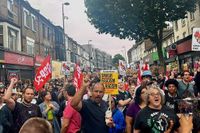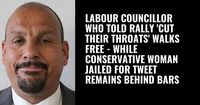On August 15, 2025, the jury at Snaresbrook Crown Court delivered a verdict that has ignited heated debate across Britain’s political spectrum. Ricky Jones, a suspended Labour councillor and former senior union official, was found not guilty of encouraging violent disorder after telling an anti-racism rally that far-right activists should "have their throats cut." The acquittal, following a brief deliberation by jurors, has stirred accusations of a "two-tier" justice system and raised difficult questions about where the law draws the line between heated rhetoric and criminal incitement.
The incident that set these events in motion occurred on August 7, 2024, on Hoe Street in Walthamstow, east London. Jones, then 58, took to the microphone at a Stand Up To Racism rally organized in response to plans for a far-right march outside the Waltham Forest Immigration Bureau. The demonstration was held in the tense aftermath of the Southport murders, which had already sparked riots and protests nationwide. Against this volatile backdrop, Jones addressed the crowd, denouncing the far-right demonstrators as "disgusting Nazi fascists" and declaring, "We need to cut all their throats and get rid of them all," while drawing his finger across his throat in a slitting gesture. The moment was captured on video and quickly went viral across social media platforms, prompting widespread outrage and a police investigation.
Jones was arrested the following day and interviewed at Brixton police station. The Labour Party suspended him almost immediately, describing his behavior as "completely unacceptable" and launching an internal investigation, which, as of the trial’s conclusion, remains ongoing. The party stated unequivocally that such conduct "will not be tolerated." According to Reuters, Jones had been a Dartford borough councillor since 2019 and was also serving as a full-time official for the Transport Salaried Staffs’ Association (TSSA) union at the time of the incident.
During his trial, Jones admitted to making the incendiary statement but insisted he never intended it to be taken literally. He explained to the court that his remarks referred specifically to reports of far-right stickers with hidden razor blades being left on trains—a tactic intended to harm unsuspecting passengers. "You’ve got women and children using these trains during the summer holidays. They don’t give a shit about who they hurt," he told the crowd, according to video evidence shown to the jury. Jones testified that he was "appalled" by political violence and maintained, "I’ve always believed the best way to make people realise who you are and what you are is to do it peacefully." He described feeling "upset" and "angry" about the recent riots and said he felt a "duty" to attend counter-protests, despite warnings from the Labour Party to steer clear of such demonstrations.
The prosecution, led by Ben Holt, painted a different picture. Holt argued that Jones had used "inflammatory, rabble-rousing language in the throng of a crowd described as a tinderbox," amplified by a microphone and speakers. The setting, Holt contended, was one where violence "could readily have been anticipated." Yet after just over half an hour of deliberation, the jury returned a not guilty verdict. Jones, who sat in the dock wearing a navy blue suit and pale pink tie, was seen mouthing "thank you" to the jurors as the decision was announced. Family and supporters hugged each other in relief before Jones was whisked away from the court in a car, declining to comment on the outcome.
The verdict has not gone uncontested. Critics, particularly from the right, have contrasted Jones’s acquittal with the fate of Lucy Connolly, a Conservative woman who is currently serving a 31-month prison sentence for a racially aggravated tweet. Connolly’s social media post, made in the immediate aftermath of the Southport murders in August 2023, called for the mass deportation of migrants and the burning of their hotels. Though she deleted the tweet shortly after posting, the court ruled it was likely to incite hatred. She pleaded guilty to the offence, but her sentence has become a lightning rod for those claiming inconsistency in the justice system.
High-profile political figures have weighed in on the controversy. Chris Philp, the Conservative Party’s home affairs spokesman, took to social media to declare, "The development of two-tier justice is becoming increasingly alarming." Nigel Farage, leader of Reform UK, echoed these concerns, pointing to what he characterized as hypocrisy and double standards in the courts. Zia Yusuf, another prominent Reform UK figure, also drew direct comparisons between Jones’s acquittal and Connolly’s imprisonment. According to BBC and Reuters, these criticisms have fueled broader claims that those who voice concerns about immigration are treated more harshly by the justice system than those aligned with left-wing or liberal causes.
The issue is not new. Prime Minister Keir Starmer himself was dubbed "two-tier Keir" by some opponents last summer, following allegations that certain ethnic groups were policed more leniently than others. Senior ministers, police chiefs, and prosecutors have consistently rejected these accusations, insisting that the law is applied impartially regardless of political affiliation or background. Nonetheless, the perception of unequal treatment persists among segments of the public and political class, as evidenced by the reactions to the Jones verdict.
For many, the case underscores the challenges inherent in balancing freedom of expression with the need to prevent incitement to violence. The law must draw careful distinctions between hyperbolic or metaphorical language—often used in the heat of protest—and genuine calls to action that could endanger public safety. As the Guardian noted in its coverage of similar cases, courts are increasingly called upon to interpret the intent and context of speech, especially in an era when social media can amplify controversial remarks far beyond their original audience.
Meanwhile, the Labour Party faces its own internal reckoning. With the investigation into Jones’s conduct still unresolved, questions remain about his future in the party and the standards to which elected officials are held. A party spokesperson reiterated that "his behaviour was completely unacceptable and it will not be tolerated," but declined to comment further until the review concludes.
As the dust settles from the Snaresbrook Crown Court verdict, the debate over what constitutes criminal incitement—and whether Britain’s justice system is truly even-handed—shows little sign of abating. For supporters of Jones, the acquittal represents a vindication of the right to protest and speak out, even in blunt and provocative terms. For his detractors, it is a troubling sign that political allegiances and public sentiment may tip the scales of justice. The verdict may be in, but the arguments it has unleashed are far from settled.


